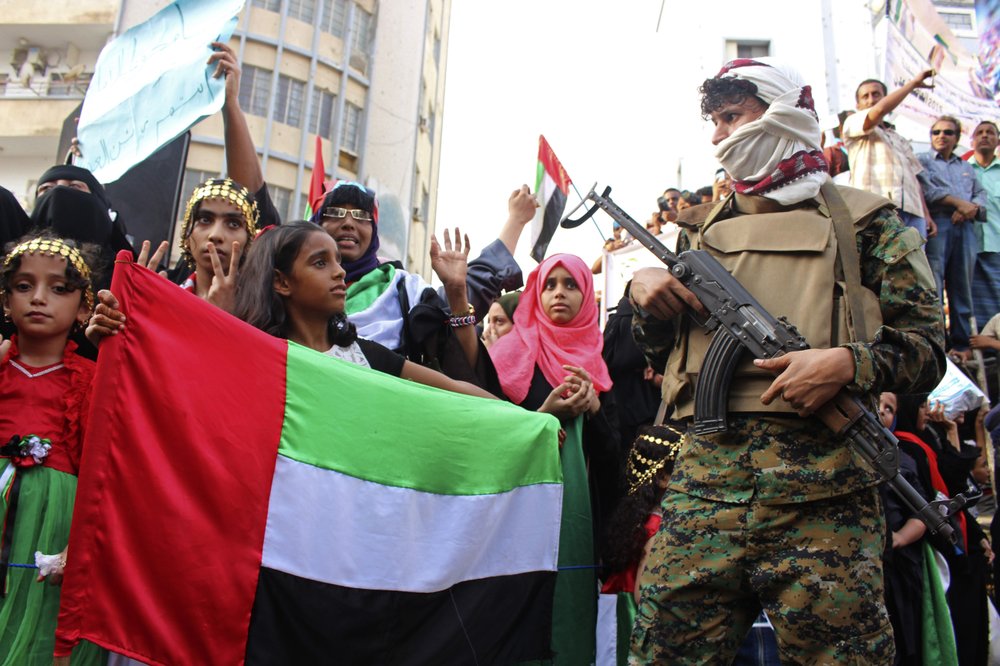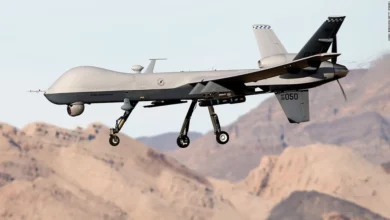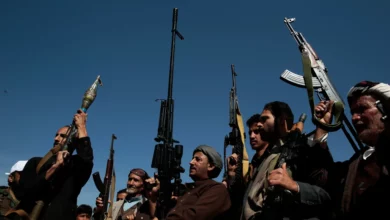SANAA, Yemen — They marched out of their tent camp in the heart of Yemen's capital, holding hands and dancing to patriotic songs blaring from loudspeakers. Several walked with canes, others carried plastic flowers. Some knelt down to offer what could be their last prayer.
It wasn't long before the gunshots rang out.
The crowd kept marching toward the rattle of automatic weapons and the wailing of sirens. An ambulance screeched back from the shooting with the first casualty, carried out on a blanket held by the corners. By day's end, four protesters had been shot to death by regime security forces and nearly 40 were wounded. Still, the marchers were upbeat as they flowed back to their camp, chanting "erhal, erhal," Arabic for "leave."
Yemen's is the longest running of the Arab Spring uprisings around the Middle East, now approaching 10 months. During that time, Egypt's and Tunisia's presidents have fallen, Libya's leader has been killed. In Syria, where protests began a month after Yemen, the uprising has turned into a constant bloodbath with a crackdown by Bashar al-Assad's regime.
Throughout, Yemen's protesters have plugged away. Despite repeated attacks by security forces, their tent camp centered at a major Sanaa intersection they dubbed "Change Square" has spread over neighboring streets and grown to some 100,000 people — doubling during weekend protests. It has become a virtual town-within-a-city, hooked up with a jury-rigged running water system and big enough for a motorcycle taxi service from one end to another.
Outside their tents, some protesters have planted date palm trees, which take years to grow, a symbol of their determination to stick it out as long as it takes.
Their fuel has been a powerful idealism. The immediate goal is to force President Ali Abdullah Saleh out of power, but running through their tent camp is a feeling that they constitute the core for a "new Yemen" in which the tribal, regional and political rivalries that have long divided the impoverished nation will melt away.
But maintaining that idealism is a tough task.
Political parties once allied with Saleh have joined the sit-in at Change Square and even come to dominate it, raising activists' fears they will hijack the movement and settle for something short of radical change sought by the "revolution." The protesters are also resisting being drawn under the wing of a senior military commander who abandoned Saleh and joined the opposition but who many activists fear is just seeking power for himself.
"The political parties are dealing with the revolution as a way of political bargaining with the regime," said Khaled al-Ansi, a 41-year-old lawyer who is among the top activists. "We will not leave when Saleh leaves. We want a civil state and we will stay put until one is in place."
Change Square has become a melting pot, drawing a rich diversity from across Yemen and bringing together slices of society that otherwise rarely mingle.
Tribesmen from the remote mountains and deserts march alongside urban professionals, and well-off merchants with the unemployed. Shia rebels from the north and secessionists from the south join in with dissident soldiers who have in the past fought both their movements. Women and men mix with startling freedom for a country where segregation of the sexes is the hard-and-fast rule.
It's been a learning experience. Activist Fouad Shogaa el-Deen recalls the day when a group of tribesmen came to join the square.
Among tribes in Yemen's mountains, you're not a real man unless you're in your traditional robes, a ceremonial dagger jammed in your belt. So the newcomers — wearing the maouz, a traditional skirt-like garment — cast a skeptical eye on the effete city youth in their Western clothes.
"Some of them came up to us, looked at us and asked us if we really thought we could topple Saleh's regime while wearing pants," said Shogaa el-Deen. "They thought that wearing pants took away something from our manhood."
"Then they saw men in pants walk fearlessly toward gunfire and that changed their mind."
Egypt is a textbook case of how difficult it is to keep up that unified spirit. Cairo's Tahrir Square saw the same sort of unity during the 18 days of protests that toppled President Hosni Mubarak. Nine months after his fall, it's been replaced by pessimism. Activists are divided, the ruling military is acting like the authoritarian Mubarak, and much of the former regime remains in place.
Yemen's activists say they have learned the lesson from Egypt not to surrender the street before broader gains are achieved than just the leader's ouster. They fear Yemen's traditional political parties that have joined their camp will be too willing to do that.
Foremost is the Islamist Islah, Yemen's best organized and wealthiest political group, which calls for the creation of a purist Islamic state.
Islah has come to dominate the organizing committee in Change Square. In the process, it is alienating many activists, including some who belong to Islah. A powerful wing of moderates inside Islah is trying to reshape the party.
One chief complaint is that Islah and other parties accepted a US-backed, Gulf-brokered deal, under which Saleh would surrender power to his vice president and a coalition government in return for immunity from prosecution for any crimes. Saleh has repeatedly promised to sign the deal only to back out at the last minute, and has shown no sign of surrendering power.
Activists say the accord will perpetuate Saleh's regime. Moreover, Ansi points out, it gives Saleh license to kill more protesters since he will receive immunity once he signs off.
"I hold these parties responsible for the blood of our martyrs," he said of the parties who agreed to the accord.
At least 500 protesters have been killed in shootings by security forces or caught in the crossfire in regime battles with dissident troops.
Ansi is an Islah member. But his loyalty to the uprising has sidelined his loyalty to the party. He quit the Change Square organizing committee to protest Islah's domination of it. He believes Islah and other traditional parties should disband completely for the length of the uprising.
"This is a revolution. Politics and parties must be cast aside until it is over," said Ansi, squatting with his iPad and laptop on a mattress in his Change Square tent, his home since he left his home, three wives and nine children in February to join the protest movement.
The camp is taking on the trappings of permanence. Water is piped from tanks filled daily. The din of electricity generators is constant, fueling the lights and televisions in nearly every tent. Small cinder-block walls have been built around the tents to keep rain water out.
A small market sells anything from winter jackets, sunglasses, gas masks, to fruits and juices. Classes are held in a large tent on a variety of topics from political awareness, computer science to first aid and English. There also are the occasional live music concerts.
Large portraits of men killed by security forces adorn most tents. Every day after lunch, most men gather in the tents chewing qat — a mild stimulant that is addictively used in Yemen — in hourslong sessions debating the country's future.
Shogaa el-Deen, like many, is counting on the human fusion in Change Square to bring far-reaching change.
"I am a liberal who feared Islah when I first came to Change Square," said Shogaa el-Deen, a 33-year-old employee of Yemen's state television.
"Living together in Change Square brought us closer. It has done something that could not have been achieved in less than five or six years of intensive contacts between various ideological groups."
Ahmed Said al-Wafi, a protest leader from the city of Taiz, warns that the movement is losing support because it was joined by the traditional political parties — and by the army's 1st Armored Division. The division's troops say they are protecting the protesters from regime forces, but some activists say their presence just gives the security forces an excuse to attack them.
He says the protesters have to adhere to the early principles of peaceful, unarmed protest.
"The world has over the years grown accustomed to violence in Yemen, so we can only get its attention back if we are a peaceful protest movement."




